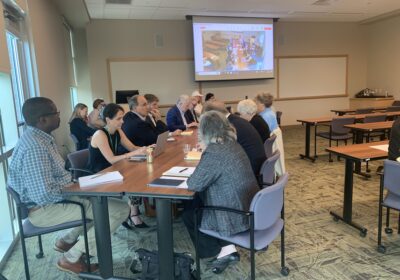Public hearing will only begin to establish election resolution
The Election Rules Committee (ERC) is set to hear grievances against the winning ticket of the student body presidential elections at a public hearing, yet its decision may not determine the next student body president.
Grievances filed by both the Melissa Leddy-Christina McLaughlin ticket and the Jason Funes-James O’Connor ticket will be heard at a public hearing today at noon in the Student Government (SG) Chambers in the Marshall Student Center. However, the process may not end there, SG advisor Gary Manka said.
“If the grievances go through and they’re upheld, it could go to the (SG) Supreme Court and it would be (an SG) Supreme Court decision,” Manka said.
The four grievances will be heard and ruled on separately by the ERC. The Leddy-McLaughlin ticket accused the winning ticket, Matthew Diaz-Zachary Johnson, of operating a mobile polling station and sliding campaign materials under student dorm room doors, while the Funes-O’Conner ticket claims they campaigned within 50 feet of a polling station and chalked in an area restricted from campaigning.
If the ERC determines the Diaz-Johnson ticket is guilty of three minor violations or one major violation, they would be disqualified from the race, though they could appeal that decision to the SG Supreme Court. Likewise, the Leddy-McLaughlin ticket or Funes-O’Connor ticket could appeal if they are unsatisfied with the ERC’s decision.
Of the four grievances filed, Leddy-McLaughlin filed one grievance that could be become a major violation by the ERC. The other three grievances would result in minor violations if upheld by the ERC.
Manka said he thinks some of the grievances will fail today.
“It’s not my decision of course, but some of the (grievances) could be thrown out, because some of the complaints cite statutes that don’t even exist,” he said.
The grievance against Diaz-Johnson for campaigning within 50 feet of a polling station filed by Funes was listed as “1.1.1 minor violation.” The correct listing can be found under section 8.11.2 Minor Violation I of the ERC Rules of Procedure (ROP). The grievance filed by O’Connor for chalking in a restricted area should have been listed as 8.11.2 Minor Violation E, but was not.
Misfiled grievances should work in favor of Diaz and Johnson, the ticket’s campaign manager Joseph Anastasio said.
“The Supreme Court last year (in Hernandez-Montgomery Campaign vs. ERC), stated the ERC cannot basically guess what the other campaign is trying to do,” Anastasio said. “So if they put down (in their grievance) statutes or (ROPs) that do not exist or are cited wrongly, those automatically should be gone because it is not the duty of the ERC to guess what (rule) the campaign is trying to (indicate).”
Diaz said he is taking the grievance process in stride.
“It’s part of the process,” Diaz said. “It’s another step to go over and once we get tomorrow situated and make everything official, we can start working for the students. It’s unfortunate we can’t start today working for the students, but we still have to deal with campaign issues. It will be all over soon.”
If Diaz’s ticket is disqualified and any appeal attempts on their behalf fail, Manka said a run-off election would occur.
“The election would just be a run-off between second and third place,” Manka said. “It would probably fall most likely sometime after Spring Break.”
During the election, which ended Feb. 24, Funes-O’Connor took second place with 1,180 votes and Leddy-McLaughlin took third place with 1,151 votes.
Presidential hopeful Jason Prado and running mate Kevin Tuttle had 492 votes.
Funes said he is ready to present his case today.
“(We’re) going to be honest and uphold the rules that are already in place,” Funes said. “(We’re) going to uphold the statutes and keep everything factually based, while at the same we know (Diaz and Johnson) know the system, and know the rules and they should be held to a high standard for opposing them.”
Leddy said it may be difficult to get the ERC to uphold the grievances
“You have to prove beyond a reasonable doubt,” Leddy said. “It’s very difficult, but I believe we have pretty strong evidence.”
In the event of a run-off, Leddy-McLaughlin and Funes-O’Conner would have a week from March 21, the day classes resume after spring break, to campaign, meaning an ultimate resolution could be delayed until the last week of March or later.






